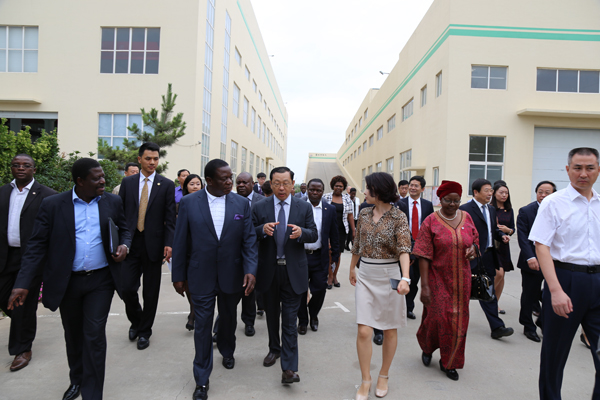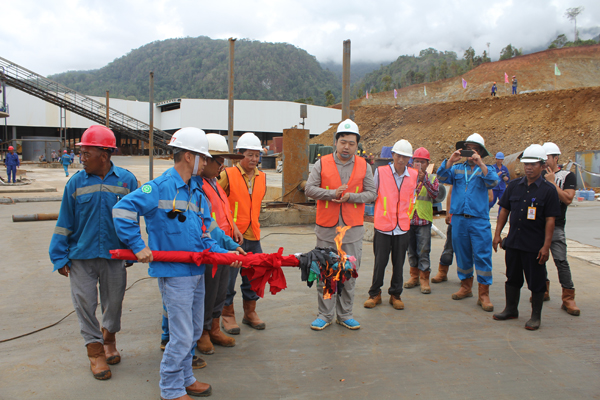Powering ahead via diversification
By LYU CHANG in Beijing/XIE CHUANJIAO in Qingdao ( China Daily )
Updated: 2016-08-15
|
|||||||||
 |
|
A Qingdao Hengshun Zhongsheng Group Co Ltd executive (center, gesticulating with his hands) introduces his company's overseas strategy to a group of Zimbabwe government officials at the company's headquarters in Qingdao, Shandong province. PROVIDED TO CHINA DAILY |
Zhongsheng Group morphs from an equipment maker to world player in industrial parks, coal, nickel and ports
When Qingdao Hengshun Zhongsheng Group Co Ltd, a firm focusing on electric projects and equipment, listed on the Shenzhen stock market in 2011, it attracted investors' attention straight away. Its more than 20 percent year-on-year growth since its founding in March 1998 was already a talking point in the State-regulated power transmission industry.Online content categorizes the company as a maker and seller of "high-voltage reactive power equipment, compensation devices and filtering devices. Its products include capacitors, reactors and coil dischargers".
When a domestic glut in power transmission and control equipment, coupled with an economic slowdown, hit the company hard in 2012, Hengshun Zhongsheng forayed into other businesses and ventured overseas the same year. It began by building industrial parks and power plants.
All those forward-looking, almost visionary-like initiatives are beginning to bear fruit now, it seems. Profits are robust and its financials sound. Investors are chasing the company's stock again.
The company, which is based in the eastern port city of Qingdao, calls it "the strong headwind in the cold winter".
The company's profit rose from 109.5 million yuan in 2014 to 338.6 million yuan in 2015, a 209.2 percent increase year-on-year.
Jia Xiaoyu, president of Hengshun Zhongsheng, attributed the growth to the company's decision to diversify its core businesses and build itself into an overseas developer of industrial parks, coal mines, power plants and ports.
"How do you define an 'owner' of a project? I think the one that can bring you the profit is the owner, regardless of which industry it comes from," Jia told reporters two years ago. He was referring to a series of deals the company had struck in recent years.
Their range was as imaginative as it was wide, Jia said. The deals were for investing in nickel ore in Indonesia and building industrial parks in Africa-all seemingly unrelated but capable of funneling gold into the company's coffers.
Perhaps, that kind of bold expansion could not have been possible without the foresight of Jia. He predicted several years ago that China's State-controlled utilities would face oversupply sooner or later as a severe and prolonged recession in the construction sector put immense pressure on the infrastructure construction sector.
"We started to think of going global in 2011 even though our profit rose more than 20 percent that year," Jia said. "Because that's when I started to feel that the power industry has less room for growth."
In 2014, Jia was looking at opportunities in Indonesia when the country banned exports of mineral ore in order to develop its own ore-processing technologies.
He decided to stock nickel ore reserves and develop a ferronickel industrial park, as the export ban was expected to drive up huge demand for nickel ore in China, a major importer of Indonesia's nickel ore.
But the company took a big leap on the back of China's "Belt and Road Initiatives", which opened up new opportunities in South and Central Asia, the Middle East and Europe.
As Beijing strengthened bilateral cooperation with Jakarta, Hengshun and two other Chinese companies teamed up to build a ferro-nickel industrial park in Indonesia, exploiting their collective experience in nickel exploration and inventory.
This also helped the companies build factories and captive power plants in industrial parks in Indonesia.
Last year, Hengshun struck a deal to build a Special EconomicZone and an industrial park in Zimbabwe to further stimulate the country's economic development and transformation.
The project is being jointly developed with China Railway Eryuan Engineering Group Co Ltd and Qingdao City Construction Investment Group.
 |
|
Qingdao Hengshun Zhongsheng Group's Chinese employees work together with their Indonesian colleagues in the company's industrial park in Indonesia. PROVIDED TO CHINA DAILY |
What attracted Hengshun was that foreign investors in Zimbabwe's SEZ were accorded several preferential policies and allowed to build industrial parks and factory shells to rent out to other companies.
"We started investing in the overseas market in 2011. Over the years, we've gathered much experience in industrial park investment, development, attracting business and operations," said Jia.
The company is now planning to use this business model in South Africa, Laos and Thailand.
In November 2015, Hengshun inked an agreement worth $114 million with Coal of Africa Limited, a leading miner in South Africa. Its Makhado coal project, located in Limpopo, South Africa's northernmost province, has a gross reserve of 790 million tons and a recoverable reserve of 340 million tons. The project is expected to kick off next year, and will likely yield 12.6 million tons of raw coal a year, according to Hengshun.
Lin Boqiang, head of the China Center for Energy Economic Research, which is under the aegis of Xiamen University, said that many industries in China are facing pressure from oversupply, while countries like Indonesia and Zimbabwe are in huge demand of energy and infrastructure construction.
"In terms of 'going global', most companies would take the mergers-and-acquisitions route to market share, or (they would) leverage their core businesses. But, sometimes, we need to think outside the box and look at what we are good at and what they can provide," Lin said.




